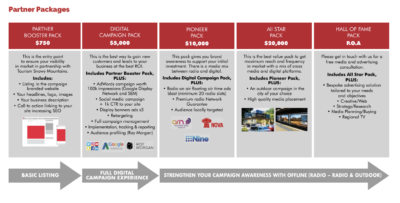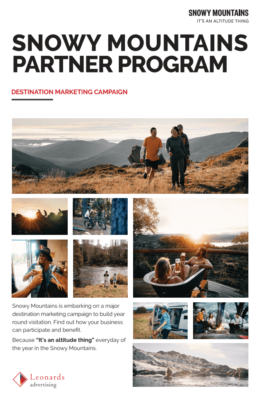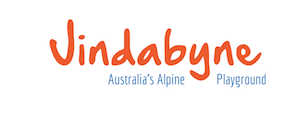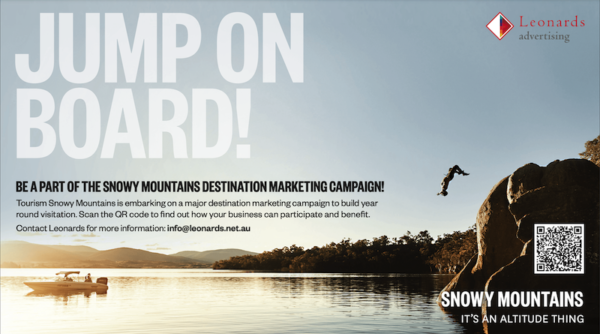Posts Tagged ‘business’
IT’S AN ALTITUDE THING this SUMMER 2022-2023 Marketing Campaign with Tourism Snowy Mountains
Be a part of something big!
Snowy Mountains is funding a major marketing and media campaign to promote awareness of the incredible landscape, culture and tourism opportunities that abound in the Snowy Mountains. This partner program which piggy-backs on the main destination campaign will drive significant awareness momentum for operators to benefit from, providing them with an opportunity to add their voice to a powerful, targeted and consolidated campaign.

CLICK HERE TO VIEW THE INFO FOLDER CONTAINING:
- Operators Overview – Master TSM Campaign and Operator Bespoke opportunity
- Snowy Mountains Partnership Program Prospectus
- Briefing form to be filled if you are keen to participate

Get Ready – NSW ban on the supply of certain single-use plastic items from 1 November 2022
Get Ready – NSW ban on the supply of certain single-use plastic items from 1 November 2022
From 1 November 2022, supply of the following items will be banned in NSW:
- Plastic single-use cutlery (spoons, knives, forks, sporks, chopsticks – any utensil used for consuming food)
- Plastic single-use plates and bowls (excludes bowls with a spill proof lid whether separate or attached)
- Plastic single-use stirrers
- Plastic single-use straws (with exemptions for people with a disability or medical need)
- Plastic single-use cotton buds
- Expanded polystyrene food ware including bowls, cups, clamshell containers and plates (includes any plastic item made in whole or in part of expanded polystyrene used to serve food or beverages)
- Plastic micro-beads in rinse off personal hygiene products
The ban applies even if they are made from biodegradable, compostable, or bioplastics. This includes those made from Australian certified compostable plastic.
Lightweight plastic shopping bags with handles (35 microns or less in thickness) have been banned since 1 June 2022.
Who do the bans apply to?
Anyone who supplies a banned item in NSW while carrying on a business. This includes activities for commercial, charitable, sporting, education, or community purposes. For example:
- Retail or hospitality businesses must not provide banned items to their customers.
- Product/packaging suppliers must not supply banned items to anyone within or into NSW.
- Community groups and not-for-profits must not supply banned items as part of a service, for regular activities or during events or fundraising activities.
What might this mean for you?
Businesses and community organisations in NSW will no longer be able to supply customers with banned items from 1 November 2022. The ban applies whether a fee is charged, or the item is given out for free.
Why is this important?
Consumers do a great job when it comes to sorting recyclable plastics from waste destined for landfill. Yet despite these efforts, plastic packaging and single-use plastic items still make up 60% of all litter in NSW. These items take thousands of years to decompose and in the process, they are causing great harm to our natural environment and wildlife.
The NSW Government is committed to phasing out problematic plastics. The NSW Plastics Action Plan was launched in June 2021 to manage plastic throughout its lifecycle – from generation through to production, supply and reducing plastic waste.
The first step is to phase out certain problematic or unnecessary plastic products. The banned plastic items have been chosen because they are highly littered and have readily available sustainable alternatives. The bans will prevent almost 2.7 billion items of plastic from entering our natural environment and waterways over the next 20 years.
The EPA’s role
The EPA, as the regulator of the bans, is committed to taking a fair and considered approach to regulation. That’s why we are focused firstly on providing information to businesses so they are aware of their upcoming obligations and can make the switch to more sustainable alternatives.
We understand there may be different circumstances for different businesses and community organisations and there is no ‘one-size-fits-all’ response. When deciding on the most appropriate regulatory action we will look at factors such as what steps have been taken to prepare for the new requirements and whether genuine effort has been made to comply.
You can read more about our overall approach to regulation in our Regulatory Strategy
How to prepare for the ban
Thank you to the many businesses and community organisations that have already made the switch to more sustainable options. If you have not yet switched, consider the following steps:
- Understand the ban – access the website for more information and FAQs to ensure you understand the ban and allowed alternatives.
- Prepare now – Inform staff, volunteers and customers early about the upcoming ban and the changes they should expect.
- Make a plan – Stop ordering banned items now and use up existing stock as much as possible, as you cannot supply banned items after 1 November 2022 (regardless of when you purchased it).
- Speak to your supplier – if you have large amounts of stock, they may accept returns or exchanges.
- Responsible disposal – If you cannot exhaust, return, exchange or transfer your stock in time, you may like to contact a local recycler or register with the Great Plastic Rescue to recycle stock into new products.
Here are two resources to help you to prepare for the ban: a guide for businesses and additional supplier advice to prepare for the ban.
Help & advice for businesses
The NSW Government has partnered with the National Retail Association to provide engagement and education services for businesses and community organisations across NSW. These free services include:
- Custom resources and signage (including information in 15 languages) – download here
- Visiting thousands of stores in 650 shopping centres and retail precincts across metropolitan and regional areas to provide face-to-face advice and resources.
- Holding regular online question and answer sessions for businesses and community organisations – register here
- Providing a specialist tollfree hotline 1800 844 946 and email sustainability@nra.net.au to answer unique business queries.
Find out more
We encourage you to review the website resources, download signage and attend the information sessions being provided by the National Retail Association. The next information session is being held on 31 August 2022.
For further enquiries about the plastics ban, please contact the EPA at plastics@epa.nsw.gov.au
Sincerely
Tony Chappel
Chief Executive
NSW Environment Protection Authority


